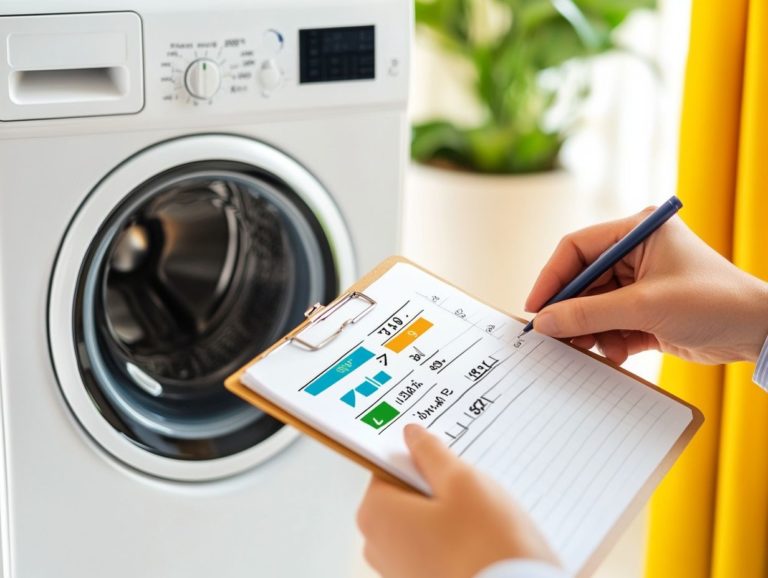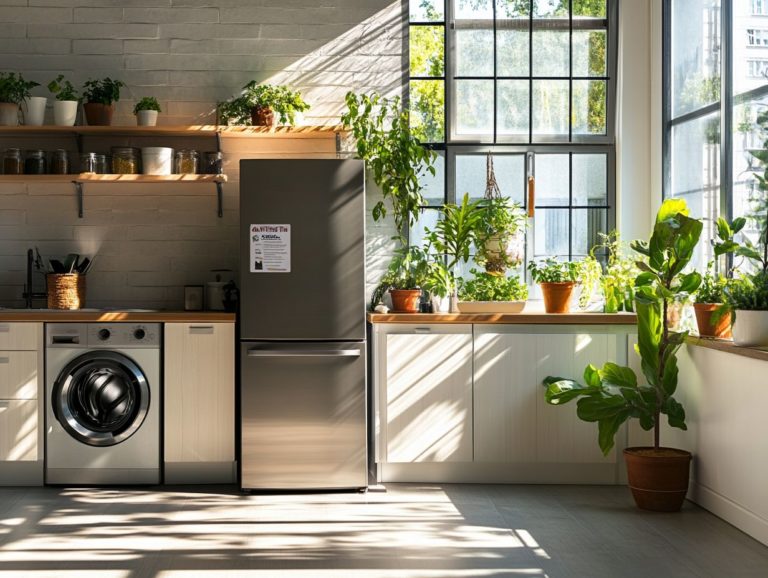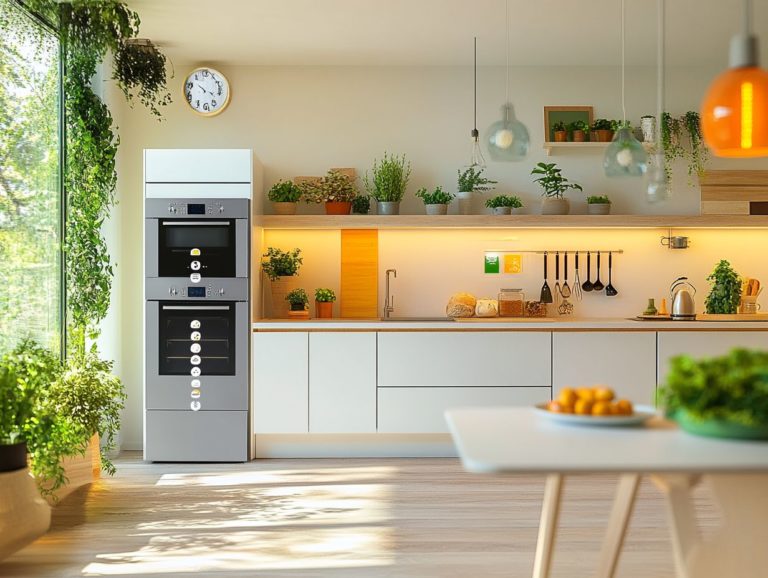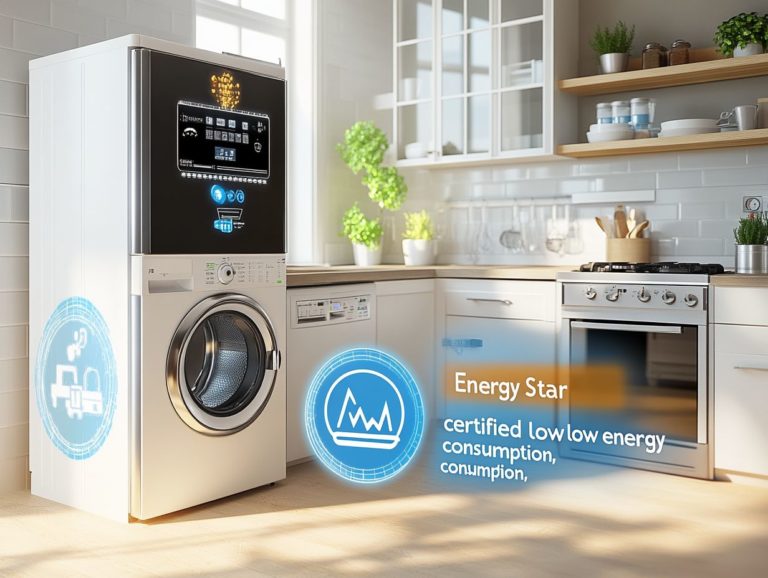Understanding Different Types of Energy-Efficient Appliances
In today s world, where energy costs are on the rise and environmental concerns loom large, selecting energy-efficient appliances is not just wise it s essential.
This article delves into what makes an appliance energy-efficient and the myriad benefits it offers. You ll discover various types of energy-efficient appliances, including refrigerators, washing machines, and air conditioners. Expert tips on how to choose and maintain these eco-friendly options will also be presented.
Join this journey through the realm of energy efficiency. Empower yourself to make informed choices that enhance your home while respecting our planet.
Contents
- Key Takeaways:
- Benefits of Using Energy-Efficient Appliances
- Types of Energy-Efficient Appliances
- Choosing the Right Energy-Efficient Appliance
- Understanding Energy-Efficient Appliances
- Tips for Maintaining Energy Efficiency
- Frequently Asked Questions
- 1. What are energy-efficient appliances?
- 2. How do energy-efficient appliances work?
- 3. What are the benefits of using energy-efficient appliances?
- 4. Are all energy-efficient appliances the same?
- 5. Can I save money by using energy-efficient appliances?
- 6. How can I ensure that I am buying a truly energy-efficient appliance?
Key Takeaways:
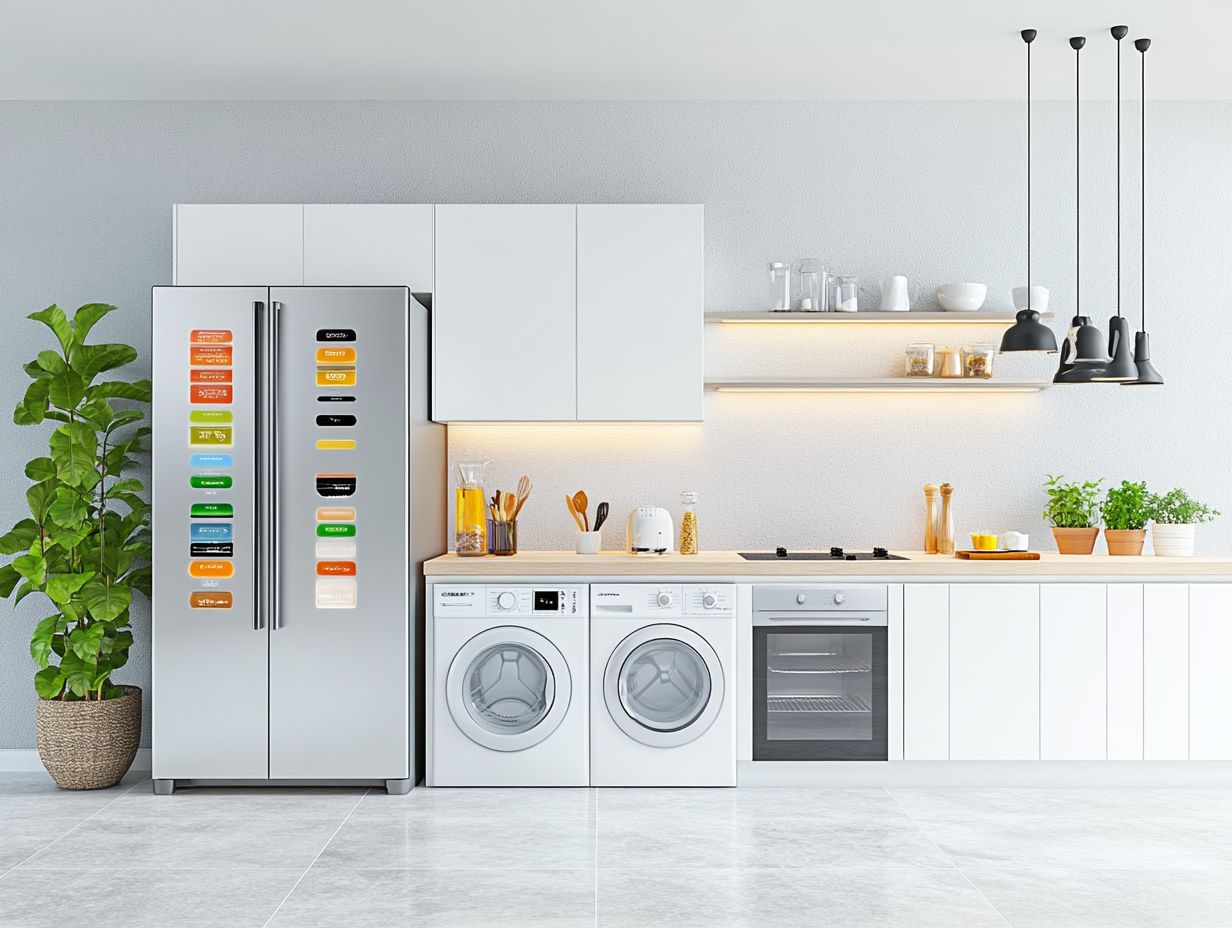
Energy-efficient appliances save money on utility bills and reduce environmental impact.
Refrigerators, washing machines, dryers, dishwashers, and air conditioners can be energy-efficient.
When choosing an energy-efficient appliance, consider size, energy efficiency rating, and maintenance requirements.
What Makes an Appliance Energy-Efficient?
Understanding what makes an appliance energy-efficient requires diving into various factors, including the latest technology, thoughtful design, and energy consumption metrics. These features work together to save you money and protect our planet!
Energy-efficient appliances cut down on greenhouse gas emissions and offer substantial savings compared to older models. This aligns perfectly with the Energy Policy goals set by the Department of Energy.
One key indicator of an appliance’s efficiency is its Energy Star certification. Energy Star is a label that shows an appliance is energy-efficient and complies with rigorous energy usage guidelines. Pay attention to energy consumption ratings to see how much electricity an appliance will consume over its lifetime.
By choosing models equipped with innovative features such as variable speed motors, smart thermostats, and superior insulation, you can dramatically reduce your energy use. These advancements lead to lower monthly utility bills and play a crucial role in decreasing overall energy demand.
This, in turn, alleviates pressure on power grids and fosters a more sustainable future.
Benefits of Using Energy-Efficient Appliances
The benefits of using energy-efficient appliances are numerous and impressive. They offer substantial savings on your utility bills and contribute significantly to environmental protection and climate change mitigation.
These thoughtfully designed appliances minimize energy consumption and reduce greenhouse gas emissions. By making this choice, you secure long-term savings and potential tax rebates while fostering a more sustainable future.
Cost Savings and Environmental Impact
The cost savings and environmental benefits of using energy-efficient products are truly remarkable. By choosing these appliances, you significantly reduce energy consumption, leading to lower utility bills and a smaller carbon footprint essential in combating climate change.
For example, when you switch to an ENERGY STAR-rated refrigerator, you can save around $300 over its lifespan while preventing over 6,000 pounds of greenhouse gas emissions. The initial investment in energy-efficient models often pays off significantly, resulting in savings that far surpass your upfront costs.
If more households embraced these products, the collective energy savings could rival the annual output of multiple power plants. This illustrates how powerful your individual choices can be, positively impacting both your finances and the environment.
Types of Energy-Efficient Appliances
You ll find a diverse array of energy-efficient appliances today, including refrigerators, washing machines, dishwashers, and air conditioners. Each of these is meticulously crafted to adhere to stringent energy consumption standards, such as those established by Energy Star.
This commitment enhances efficiency and significantly reduces environmental impact. You can make a positive contribution while enjoying modern conveniences.
Explore energy-efficient appliances in your home today!
Refrigerators and Freezers

Refrigerators and freezers rank among the most energy-hungry appliances in your home. Choosing energy-efficient models is essential for reducing energy bills and greenhouse gas emissions. Opting for Energy Star-certified appliances ensures that these units meet strict energy consumption standards.
By selecting models with this certification, you can significantly lower your electricity usage without sacrificing cooling performance. Innovative technologies, like smart thermostats and enhanced insulation, further elevate efficiency, allowing these appliances to adapt to your household’s varying needs and temperatures. Smart refrigerators can monitor conditions and adjust energy use, keeping your food fresh and cutting waste.
Emphasizing the long-term benefits of these advanced features can inspire you to make greener choices that lighten your wallet and contribute to a more sustainable environment.
Washing Machines and Dryers
Energy-efficient washing machines and dryers use significantly less water and energy. This offers you substantial savings on your utility bills while also playing a vital role in environmental protection.
Equipped with advanced technologies, these models automatically adjust water and energy use based on load size. Many efficient units feature quick wash cycles, high spin speeds, and eco-friendly drying options, minimizing resource consumption.
By choosing these appliances, you enjoy a cost-effective laundry experience while contributing to the global effort to reduce carbon footprints. Making the switch to energy-efficient machines provides financial relief and promotes sustainability for future generations.
Dishwashers
Modern energy-efficient dishwashers offer numerous benefits compared to older models. They minimize both energy and water usage while providing outstanding cleaning performance, proudly backed by Energy Star certification.
These modern dishwashers make cleaning up a breeze while helping the planet. By selecting Energy Star certified models, you can reduce utility bills and make a financially smart investment over time.
Water-efficient designs cater to eco-conscious consumers, enhancing the allure of these dishwashers. As you prioritize eco-friendliness in your purchasing decisions, the economic advantages of investing in efficient models become evident, creating a win-win scenario for you and the planet.
Air Conditioners and Heaters
Energy-efficient air conditioners and heaters are vital for a comfortable indoor environment. They help lower your utility bills and reduce greenhouse gas emissions, positively contributing to climate change initiatives.
You have various options, including ductless mini-split systems and geothermal heat pumps. Geothermal heat pumps use the earth’s stable temperature to heat or cool your home, delivering impressive energy savings compared to traditional units.
When selecting a system, pay attention to federal standards and Energy Star ratings. These benchmarks are essential for guiding you toward products that excel in performance while complying with energy regulations, making sustainable choices accessible and efficient.
Choosing the Right Energy-Efficient Appliance
Selecting the perfect energy-efficient appliance demands attention to several key factors. Evaluate energy consumption rates, look for the coveted Energy Star certification, and consider long-term savings from efficient models.
Each choice you make impacts your utility bills and contributes to a more sustainable future. Make every choice count for your wallet and the environment!
Understanding Energy-Efficient Appliances
Factors to Consider
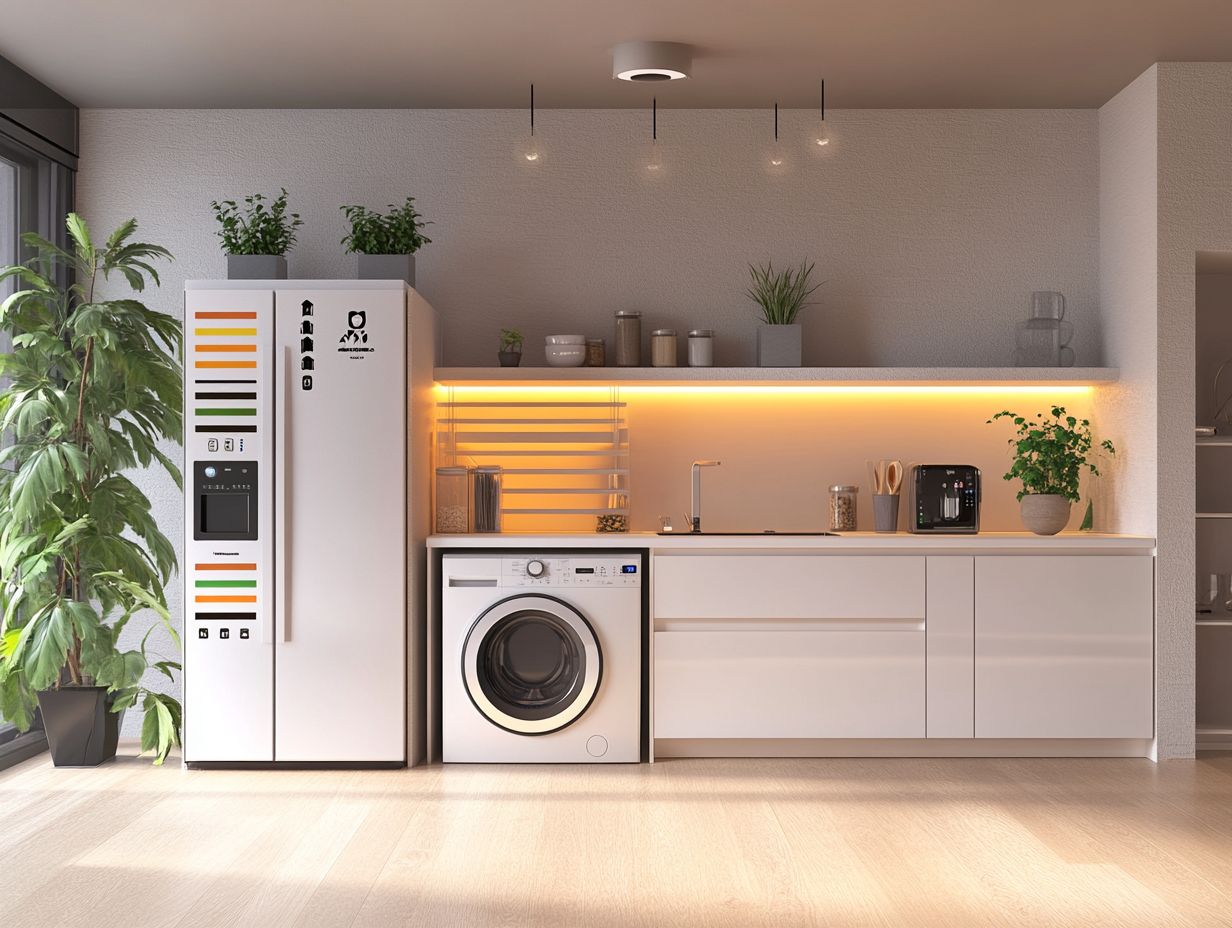
Select energy-efficient appliances carefully. Consider factors like energy consumption and Energy Star certification.
Also, ensure the appliance aligns with your household’s energy needs and usage patterns.
Look at the available features. Seek options that enhance functionality while conserving energy, such as smart technology that optimizes usage based on real-time data.
Check how well the appliance meets energy efficiency standards, as this can impact your long-term savings.
To make informed decisions, compare different models, read user reviews, and consult with energy specialists for valuable insights.
Understanding the balance between upfront costs and future savings helps you make better choices that benefit both your wallet and the environment.
Tips for Maintaining Energy Efficiency
Maintaining energy efficiency extends the lifespan of your appliances and secures substantial energy savings.
You can easily achieve this through straightforward appliance maintenance and effective energy management practices.
Embrace these strategies to save money and enjoy a comfortable living space!
Proper Usage and Maintenance Techniques
Proper usage and maintenance techniques maximize the efficiency of energy-efficient products. This ensures they operate at peak performance.
Routinely clean filters and coils, check seals for leaks, and calibrate settings according to manufacturer guidelines.
Scheduling regular energy audits helps identify inefficiencies and make necessary adjustments, enhancing overall functionality.
These practices extend the life of your appliances and lead to significant savings over time.
By adopting these techniques, you contribute to a more sustainable future while enjoying lower utility bills.
Frequently Asked Questions
1. What are energy-efficient appliances?
Energy-efficient appliances are designed to use less energy than traditional appliances, resulting in lower energy consumption and electricity bills.
2. How do energy-efficient appliances work?
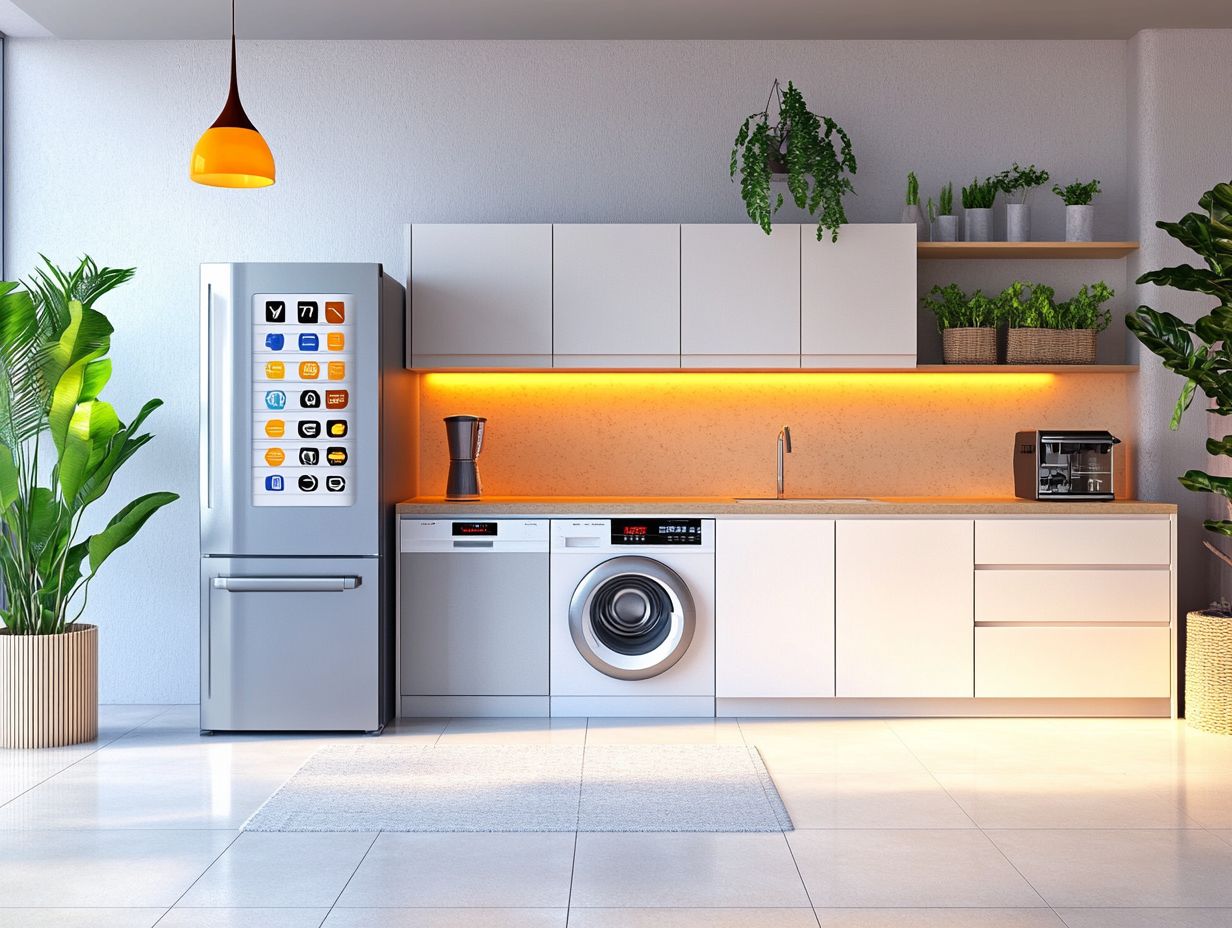
Energy-efficient appliances utilize advanced technology and design features to consume less energy while performing the same tasks as traditional appliances.
They often use less electricity or water, have better insulation, and are more efficient with resources.
3. What are the benefits of using energy-efficient appliances?
Using energy-efficient appliances offers benefits like reduced energy consumption, lower electricity bills, a smaller carbon footprint, and a longer lifespan for the appliances.
They contribute to a more sustainable environment by conserving natural resources.
4. Are all energy-efficient appliances the same?
No, energy-efficient appliances come in different types and models, each with unique energy-saving features. To better grasp their advantages, consider understanding the costs of energy-efficient appliances.
Some may be more efficient in electricity use, while others excel in water efficiency. Research and compare different types before purchasing to find the best fit for your needs.
5. Can I save money by using energy-efficient appliances?
Yes, energy-efficient appliances can lead to significant savings on electricity bills.
Though the initial cost may be higher, long-term savings from reduced energy consumption can offset the upfront cost.
6. How can I ensure that I am buying a truly energy-efficient appliance?
Look for the Energy Star label, a certification from the U.S. Environmental Protection Agency (EPA) for energy-efficient products.
Check the product’s energy rating and read reviews from other customers to determine its energy efficiency.
Discover the best energy-efficient appliance for your home today!

